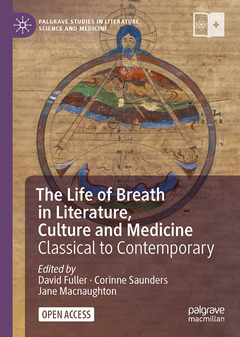The Life of Breath in Literature, Culture and Medicine, 1st ed. 2021 Classical to Contemporary Palgrave Studies in Literature, Science and Medicine Series

This open access book studies breath and breathing in literature and culture and provides crucial insights into the history of medicine, health and the emotions, the foundations of beliefs concerning body, spirit and world, the connections between breath and creativity and the phenomenology of breath and breathlessness. Contributions span the classical, medieval, early modern, Romantic, Victorian, modern and contemporary periods, drawing on medical writings, philosophy, theology and the visual arts as well as on literary, historical and cultural studies. The collection illustrates the complex significance and symbolic power of breath and breathlessness across time: breath is written deeply into ideas of nature, spirituality, emotion, creativity and being, and is inextricable from notions of consciousness, spirit, inspiration, voice, feeling, freedom and movement. The volume also demonstrates the long-standing connections between breath and place, politics and aesthetics, illuminating both contrasts and continuities.
David Fuller is Emeritus Professor of English at the University of Durham, UK. He has written on literary works from medieval to contemporary, on editorial theory, on opera and on dance. His most recent book is Shakespeare and the Romantics in the series ‘Oxford Shakespeare Topics’ (2021).
Corinne Saunders is Professor of English and Co-Director of the Institute for Medical Humanities at the University of Durham, UK, and specialises in medieval literature and history of ideas. Her most recent book is the co-edited volume Visions and Voice-Hearing in Medieval and Early Modern Contexts (Palgrave Macmillan 2020).
Jane Macnaughton is Professor of Medical Humanities, Director of the Institute for Medical Humanities at the University of Durham, UK, and a practicing physician. She was Principal Investigator on the Wellcome-funded Life of Breath project (2014-20) and is a co-editor of The Edinburgh Companion to Critical Medical Humanities (2016).
This book is open access, which means that you have free and unlimited accessDraws on medical humanities perspectives
Studies philosophy, history and literature from classical to contemporary
Examines ideas of breath and breathlessness, their cultural and creative significance, and their resonances for contemporary understanding and experience
Date de parution : 10-2021
Ouvrage de 555 p.
14.8x21 cm
Date de parution : 10-2021
Ouvrage de 555 p.
14.8x21 cm



